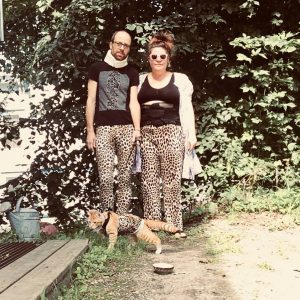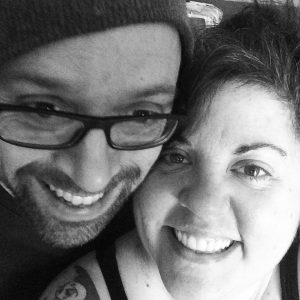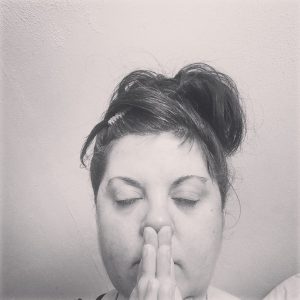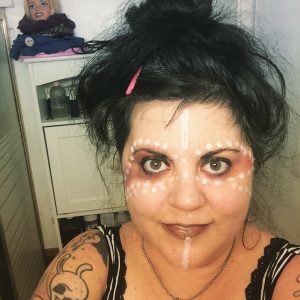Name: Robyn Joy
Age: 42
Location: Vermont
Recovery Date: January 1, 2016
Recovering From: Life! (and Alcohol)
About Robyn Joy: Oh gosh. I am a lover of animals and innocence. I am a vegetarian, a writer, and a singer in a band. I live in a great community with my family of my two best friends, Lloyd (husband) and Thomas (kitten). I love the ocean and the outdoors in the warmer months. I would get more done if everything I wanted or needed to take in was a graphic novel or a Netflix series.
Instagram: @ieffenheartyou
Blog: The Comma Struggle (poetry and prose about recovery from addiction and trauma)
Q. Before you entered recovery, what did you think the “thing” you were addicted to gave you, did for you, etc.?
A. Social currency. Personality. Sex appeal. Thrilling adventures. A crew. Confidence.
Q. Now that you are in recovery, what have you learned about that “thing?”
A. I was medicating my innate introversion and a lot of inner pain while looking for someone to save me from myself.
Q. How are you recovering (e.g., 12-step program, rehab, counseling, on your own, etc.)?
A. It’s not one thing and it isn’t linear. I did an inpatient rehab program at the end of 2015, but I relapsed immediately. I’ve since done some 12 Step work, occasional Refuge Recovery sits, and intensive therapy (both individual and with my partner). I have a yoga practice and by that I mean the whole thing, including a physical aspect and regular meditation. I read recovery memoirs and watch movies and shows about people in recovery. I say “Yes” when someone asks me to share my story, either privately or publicly. I’ve fallen in love with sober zine and blog writers and the folks in various online recovery communities. I write my own sober zine and talk a lot about sobriety on social media. I drink a LOT of bubble water. Here’s a big one: I’ve been unraveling tightly wound beliefs, memories, and traumatic events to understand how I got here. And bigger still: I’ve learned about forgiveness and compassion.
Q. In recovery, how do you give yourself what you thought that “thing” provided?
A. I don’t want the same life anymore. I am much more even without all the noise. The “thing” I give myself now is not placating to what other people want me to be and being what I am.
A. On the outside I was doing okay, but I wasn’t thriving or doing my best. I felt pathetic. I was drinking a minimum of 2 bottles of wine every night, often heading to the bar for more. I worried about not having enough alcohol all the time and either worked really hard to appear to be pacing myself, or drank with people who drank the same way. I blacked out often. I would ingest anything that was put in front of me because I liked inviting danger. I wanted to get hurt because I hated myself.
Q. What has been the hardest part of recovery so far?
A. Facing the things I couldn’t drown with booze. Facing the things I said and did while in that place of addiction. Being so hyper-aware of how soaked our culture is in alcohol. I feel on the outside sometimes because no one wants to say or do the wrong thing, and I don’t want them to either, but I also don’t want an edited version of people. I’ve lost people. Being in love with the same person I was with before I got sober was initially a huge obstacle, but we’ve found our way.
Q. What about recovery has been easier than you had anticipated?
A. Not drinking. That is super easy. Also, the challenge of being in drinking environments while sober isn’t that I want to drink, it’s hard because the energy of a person and a room changes with alcohol and I am not comfortable there anymore.
Q. What has helped you the most in recovery?
A. Listening to what I need and believing that I deserve it.
Q. Who has helped you the most in recovery?
A. Lloyd has stuck it out with me even when it was really hard for both of us. Beyond him, I can’t name one person. It has been a spectrum of people who have maybe come and gone, but who affected me in very poignant ways.
Q. What has been the biggest surprise about recovery?
A. I used to consider myself a “shy extrovert” but actually, I am an introvert and always have been. I am full of anger and fear that I used to think was just drunk rage, but it’s still here.
Q. What role has family played in your recovery?
A. Many people are still in a world that doesn’t think alcohol is bad and I can’t safely live there anymore. I’ve sometimes had a hard time particularly with my bio-fam because I think they understand addiction to have the prerequisite of chemical dependency, something I didn’t have, so they don’t always get what I’m doing.
Q. Knowing what you do now, what would you tell your pre-recovery self about recovery?
A. It’s going to get both easier and harder, but have faith that you are always going to be okay.
Q. What would you say to someone who is thinking about recovery?
A. You will hear things about how you have to do things a particular way to stay sober, but always remember that everybody’s recovery looks different, and if what you do keeps you from partaking and helps you thrive, you are doing it right. Have faith that you are always going to be okay.
If there is anything else you want to add, please do …





